2016 Postmortem
Related: About this forumWhen Oil Is Worth More Than Lives, Our Nation Has Lost Its Moral Compass
Explains the Big Picture, too.
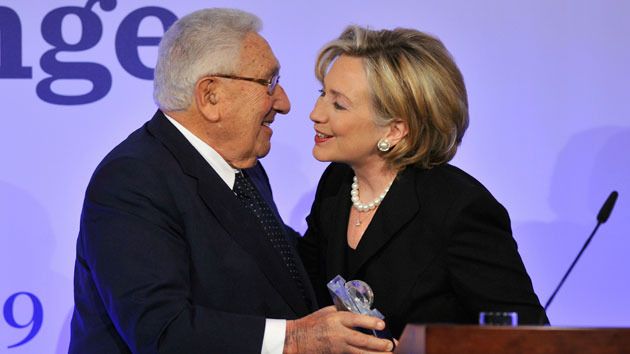
JACQUELINE MARCUS FOR BUZZFLASH AT TRUTHOUT, Wednesday, 20 April 2016
EXCERPT...
This is what we’ve learned for the last decades from ongoing US military intervention in the Middle East: oil is valued higher than life itself. It’s very real, it’s tangible and it merits the mass murder of hundreds of thousands of human beings because it is the engine of fossil fuel capitalism.
Other than that—they’re just disposable countries to G.W. Bush, Obama, and Hillary Clinton…floating in space, and so when the bombs fall, and a five-year-old girl’s legs are blown into shreds of flesh with her grandmother’s head that looks like a squashed watermelon covered in blood—that’s all simply lost in the euphemism of “collateral damage” when they give the orders to drop missiles from drones that are flown from pilots in secret rooms in the US thousands of miles away like a video game, and from fighter jets, where the earth can’t even sometimes be seen through cloud cover.
SNIP...
When G.W. Bush annihilated all those innocent families living in Iraq, a people that did nothing whatsoever to the United States, wrongly accused of being associated with the 9-11 attack, when our own soldiers lost their limbs and families, he went out and played golf, or else he exercised in the White House gym. Everything’s fine, he must have told himself. The oil will continue to be under our control.
Fast forward to 2016, after Obama and Clinton pursued their “regime change” plans by stirring up chaos, something that the CIA is very good at doing by handing out weapons to anyone who wanted them while our U.S. corporate media reported them as “rebels” and “freedom fighters” in Syria around 2010-11 back when Syria was a functional country—they got what they wanted: a full-blown war of chaos. Ah, the weapon contractors must have been popping expensive bottles of champagne as they toasted to more billion-dollar contracts, paid for by, you, the American tax payers. And the bombs fell from all sides.
SNIP...
So my suggestion to the Bush and Obama administrations, and their war advisers and weapon suppliers, is that before they give moral sermons to leaders of European countries and to the people of the United States to open their arms to eight million starving refugees from the Middle East, since they’re the ones that planned for invasions across those oil-rich countries in the comfort of their lush surroundings, since they’re the ones that gave the orders to drop thousands and thousands of weapons of mass destruction over millions of people and their homes for the last fifteen years—then they should be the first ones to adopt refugee families into their own homes.
CONTINUED...
http://www.truth-out.org/buzzflash/commentary/when-oil-is-worth-more-than-lives-our-nation-has-lost-its-moral-compass
"Money trumps peace." -- pretzeldent George W Bush
Kalidurga
(14,177 posts)Don't judge me. The reason I thought that is precisely because I agree with this article. I said if it's true that it's a war for oil it means very bad things about our morality and it isn't something I can tolerate a Democrat voting for. This was back in 2002/2003 or so as I don't remember exactly when the talk of war started IIRC the vote was in March 2003.
Octafish
(55,745 posts)Prescott Bush emobides what Ike was talking about when he thought of making it: “Military-Intelligence-Congressional Complex.”
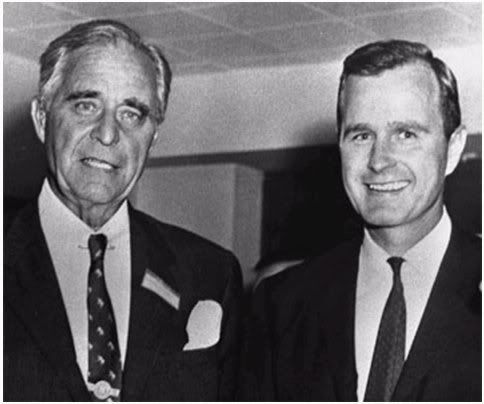
Check out what U.S. Senator Prescott Sheldon Bush, wrote back in 1959, cheerleading for Boeing, General Electric, Westinghouse, Remington, Chevron and the rest of the war profiteers hogging at the trough of the U.S. Treasury:
To Preserve Peace Let’s Show Russians How Strong We Are
By Prescott Bush
U.S. Senator from Connecticut;
member of the Senate Armed Services Committee
The Reader’s Digest July 1959
MAN’S GREATEST danger, it is said, is ignorance. In a very real sense, the Soviet Union’s ignorance of our military strength may be the source of her gravest peril—and ours. Kaiser Wilhelm started World War I because he miscalculated Allied power. Hitler, mistakenly thinking he could blitz the world, launched World War II. Kruschev today lacks firsthand knowledge of our country; he may be given what others think he would like to hear—rather than an objective report on our actual military strength. Although it seems impossible that any sane person could start a war, we would be wise to take no chances.
Why not invite the Soviet high command to the United States for a conducted tour of our military might? We are bringing Russians to see our farms and factories, our scientific laboratories and research centers; we exchange dancers and musicians. Why not have their military leaders over for the most beneficial look of all? Our expressed policy, the aim and purpose of our entire defense system, is to deter the Kremlin from starting a war. What better way to deter than to show?
What we could show is nothing more nor less than the greatest military might ever assembled in the history of the world. If the Soviet high command could see what we have, they should be of our mind—that for them to start war today would be an act of insanity.
We could start in a Pentagon briefing room. There, with maps, globes, films and sound-projection equipment to help illustrate our points, we could give them a good hard look at the distribution of American power. Then we could fly the group to Mountain Home Air Force Base in Montana, where bombers of the Strategic Air Command are on 24-hour alert, many ready to take off within 15 minutes. We could see an awe-inspiring line of B-47’s, any one of which can, in a single mission, deliver explosive power equivalent to that of all the bombs dropped by all sides in World War II. We could invite the commander of the Soviet air force to ride in one of these planes, and see it refueled in the air, thus quietly demonstrating that, while most Soviet bombers would have to fly one-way missions, ours can strike any target in the world and return nonstop.
SNIP...
The demonstration at SAC should effectively dismiss from Soviet minds any speculation about the possibility of their gaining an advantage from all-out war any time soon. But we must face the fact that in a few years the Russians may be able to zero in our SAC bases with ballistic missiles. To drive this temptation out of their minds, we could show them other deterrents.
CONTINUES…
The Reader’s Digest
July 1959 pp. 25-30
Prescott Bush detailed how Kruschev and the head of the Soviet armed forces be our guest on nuclear submarines, demonstrations of sea- and land-launched ICBMs, operations from aircraft carriers and a cruise aboard the inter-continental strategic bomber, the B-52.
The guy was on to something. You know how much they get for a B-2 these days? Two billion? Each?
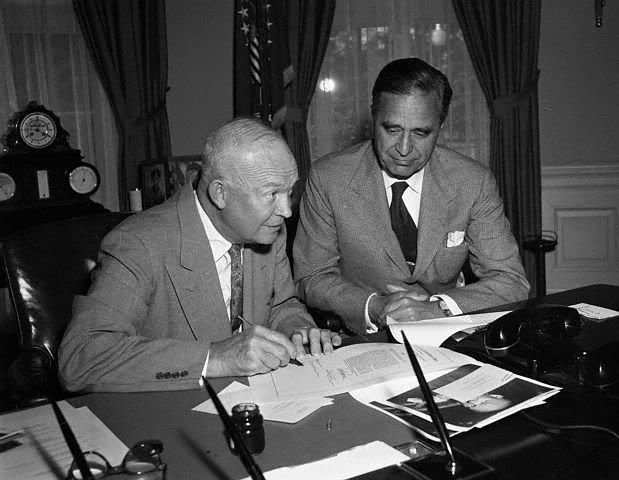
Almost forgot. Prescott also discussed the strategic importance of Iraq – the very same right next door to Iran, the very place the CIA and MI6 had, five years earlier, replaced a democratically elected government with a despot, the Shah. For the oil, I’d wager.
It’s fortunate for them that we want only peace with justice. Our entire record attests to that. We have no history of aggression, profess no desire for world domination, as do the Communists. Only by their continued menace have we been forced to take these measures for defense.
I ASK, “Why don’t we show the Russians many of these defense measures?” What I would not show them is any self-satisfaction on our part about the future, any slowing-up of plans to produce the new weapons which must inevitably take the place of the old ones. I believe we are in a continuing struggle to keep on top in this business of declaring war. I think that the Russians are never to be underrated. [font color="green"]I also believe that the Communists are master bluffers that they seek to put us off by arrogant threats to Berlin and to the peace of the far Pacific, and, while our people are preoccupied with these threats, they may try to take over Iraq as the Chinese Reds have conquered Tibet.
[/font color]
For at least three generations, members of the Bush family have had their eyes on Iraq’s oil. Interesting how Prescott mentioned Tibet's destruction by China. How was he to know his namesake would one day become head of the U.S.-China Chamber of Commerce? The article also shows how Prescott boosted the Cold War, way back in ’59. It’s not so odd to think that three generations of crazy petrodollar-loving warmongers would rise to the top echelons of American leadership.
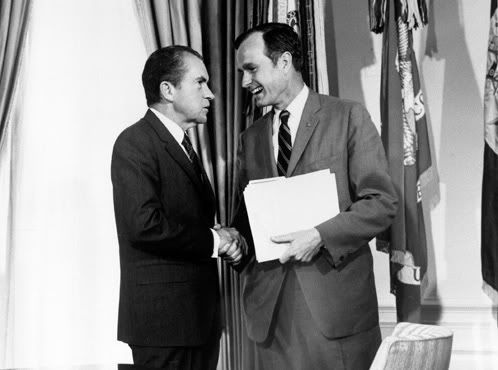
PS: Honesty is a major component of Integrity. Knowing you by what you've written over the years since, Kalidurga, it's clear you have both.
Trust Buster
(7,299 posts)haikugal
(6,476 posts)rhett o rick
(55,981 posts)that it was poisoning their water. She cares nothing about people only wealth. Watch the Clinton Family wealth grow and grow while many of us are struggling.
She loves the growing wealth gap that has made her super wealthy.
Octafish
(55,745 posts)This one got to me.
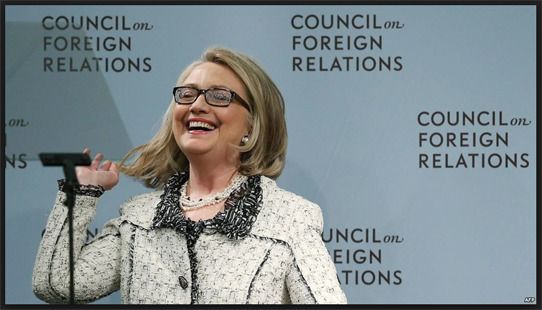
C-SPAN aired Secretary of State Hillary Clinton's remarks at the Peter G. Peterson Institute. Pete Peterson made billions as a private equity underwriter (PEU). He used $1 billion to establish his institute, focused on getting America's financial house of cards in order (without asking corporations or the rich to step up in any major way.)
[font color="green"]America believes government cannot do anything competently, thus the private sector is the answer. That goes for international development.[/font color]
SNIP...
That requires partners. Giants of philanthropy gathered in New York in 2009. This list included Bill Gates, Warren Buffet, Pete Peterson, George Soros, David Rockefeller, and Oprah Winfrey.
SNIP...
Clinton stated in her talk:
[font color="green"][font size="5"]Aid chases need, investment chases opportunity.[/font size][/font color]
[font color="green"]She mentioned the Clinton Foundation as a partner. President Bill Clinton privatized government functions during his two terms, benefiting multiple private equity underwriters.[/font color]
CONTINUED...
http://stateofthedivision.blogspot.com/2010/01/hillary-clinton-speaks-from-peter-g.html
And money trumps peace.
Octafish
(55,745 posts)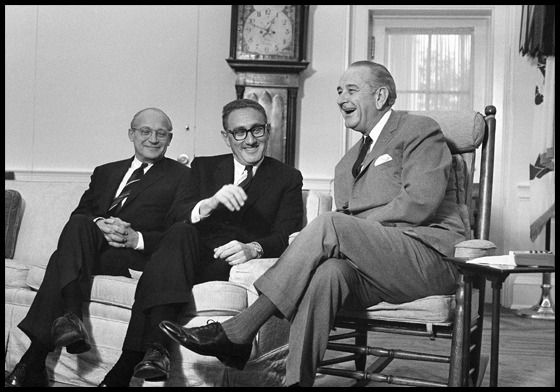
CIA Helped Bush Senior In (Vietnam) Oil Venture
A Real News exclusive, first published on The Huffington Post
By Russ Baker | January 7, 2007
Newly released internal CIA documents assert that former president George Herbert Walker Bush's oil company emerged from a 1950's collaboration with a covert CIA officer.
Bush has long denied allegations that he had connections to the intelligence community prior to 1976, when he became Central Intelligence Agency director under President Gerald Ford. At the time, he described his appointment as a 'real shocker.'
But the freshly uncovered memos contend that Bush maintained a close personal and business relationship for decades with a CIA staff employee who, according to those CIA documents, was instrumental in the establishment of Bush's oil venture, Zapata, in the early 1950s, and who would later accompany Bush to Vietnam as a “cleared and witting commercial asset” of the agency.
According to a CIA internal memo dated November 29, 1975, Bush's original oil company, Zapata Petroleum, began in 1953 through joint efforts with Thomas J. Devine, a CIA staffer who had resigned his agency position that same year to go into private business. The '75 memo describes Devine as an “oil wild-catting associate of Mr. Bush.” The memo is attached to an earlier memo written in 1968, which lays out how Devine resumed work for the secret agency under commercial cover beginning in 1963.
“Their joint activities culminated in the establishment of Zapata Oil,” the memo reads. In fact, early Zapata corporate filings do not seem to reflect Devine's role in the company, suggesting that it may have been covert. Yet other documents do show Thomas Devine on the board of an affiliated Bush company, Zapata Offshore, in January, 1965, more than a year after he had resumed work for the spy agency.
CONTINUED...
http://whowhatwhy.org/2007/01/07/cia-bush-senior-oil-venture/
rhett o rick
(55,981 posts)disagree with the statement "Oil has always been important to our economy." Maybe there is an insinuation there that some don't believe it. And what the hell does, "Hillary didn't invent that." mean? Maybe insinuating that Hillary isn't to blame for the destruction of our environment for oil profits. Again, I think we all agree she didn't invent that, but some will say she has profited from it greatly.
Maybe the post was meant to distract us from the fact that Clinton, as SoS, was helping Chevron convince foreign countries to utilize fracking, even though the peoples that were adversely affected were f'n protesting the contamination of their water supplies. Wow, to be able to stand beside the Chevron Corp and look those poor people in the eye and tell them that Oil Profits were more important than their damn water. She is tough. Tough on the side of corporations. I don't understand why she was helping Chevron while she was working for us.
My Good Babushka
(2,710 posts)Without peace, there are no other possibilities.
But because it is not dollars, they don't count it.
Octafish
(55,745 posts)Scholar. Sage. Pro-business. Big ideas of how to make a killing. Heh heh heh.
The Pitfalls of Peace
The Lack of Major Wars May Be Hurting Economic Growth
Tyler Cowen
The New York Times, JUNE 13, 2014
The continuing slowness of economic growth in high-income economies has prompted soul-searching among economists. They have looked to weak demand, rising inequality, Chinese competition, over-regulation, inadequate infrastructure and an exhaustion of new technological ideas as possible culprits.
An additional explanation of slow growth is now receiving attention, however. It is the persistence and expectation of peace.
The world just hasn’t had that much warfare lately, at least not by historical standards. Some of the recent headlines about Iraq or South Sudan make our world sound like a very bloody place, but today’s casualties pale in light of the tens of millions of people killed in the two world wars in the first half of the 20th century. Even the Vietnam War had many more deaths than any recent war involving an affluent country.
Counterintuitive though it may sound, the greater peacefulness of the world may make the attainment of higher rates of economic growth less urgent and thus less likely. This view does not claim that fighting wars improves economies, as of course the actual conflict brings death and destruction. The claim is also distinct from the Keynesian argument that preparing for war lifts government spending and puts people to work. Rather, the very possibility of war focuses the attention of governments on getting some basic decisions right — whether investing in science or simply liberalizing the economy. Such focus ends up improving a nation’s longer-run prospects.
It may seem repugnant to find a positive side to war in this regard, but a look at American history suggests we cannot dismiss the idea so easily. Fundamental innovations such as nuclear power, the computer and the modern aircraft were all pushed along by an American government eager to defeat the Axis powers or, later, to win the Cold War. The Internet was initially designed to help this country withstand a nuclear exchange, and Silicon Valley had its origins with military contracting, not today’s entrepreneurial social media start-ups. The Soviet launch of the Sputnik satellite spurred American interest in science and technology, to the benefit of later economic growth.
War brings an urgency that governments otherwise fail to summon. For instance, the Manhattan Project took six years to produce a working atomic bomb, starting from virtually nothing, and at its peak consumed 0.4 percent of American economic output. It is hard to imagine a comparably speedy and decisive achievement these days.
SNIP...
Living in a largely peaceful world with 2 percent G.D.P. growth has some big advantages that you don’t get with 4 percent growth and many more war deaths. Economic stasis may not feel very impressive, but it’s something our ancestors never quite managed to pull off. The real questions are whether we can do any better, and whether the recent prevalence of peace is a mere temporary bubble just waiting to be burst.
Tyler Cowen is a professor of economics at George Mason University.
SOURCE: http://www.nytimes.com/2014/06/14/upshot/the-lack-of-major-wars-may-be-hurting-economic-growth.html?_r=0
The guy seems to specialize in Big Ticket themes:
Just when I thought, maybe, we had reached bottom and were ready to bounce up -- I discovered there may be no bottom -- for me and the large part of the 99-percent.

Economist Tyler Cowen of George Mason University has seen the future and it looks bleak for most of us. Thankfully, those at the top, though, are in for some more good times. He spoke about his findings with NPR's Steve Inskeep. I almost dropped my smartphone into my coffee while texting during rush hour, listening to the report this morning, I was so steamed.
Tired Of Inequality? One Economist Says It'll Only Get Worse
by NPR STAFF
September 12, 2013 3:05 AM
Economist Tyler Cowen has some advice for what to do about America's income inequality: Get used to it. In his latest book, Average Is Over, Cowen lays out his prediction for where the U.S. economy is heading, like it or not:
"I think we'll see a thinning out of the middle class," he tells NPR's Steve Inskeep. "We'll see a lot of individuals rising up to much greater wealth. And we'll also see more individuals clustering in a kind of lower-middle class existence."
It's a radical change from the America of 40 or 50 years ago. Cowen believes the wealthy will become more numerous, and even more powerful. The elderly will hold on to their benefits ... the young, not so much. Millions of people who might have expected a middle class existence may have to aspire to something else.
SNIP...
Some people, he predicts, may just have to find a new definition of happiness that costs less money. Cowen says this widening is the result of a shifting economy. Computers will play a larger role and people who can work with computers can make a lot. He also predicts that everyone will be ruthlessly graded — every slice of their lives, monitored, tracked and recorded.
CONTINUED with link to the audio...
http://www.npr.org/2013/09/12/221425582/tired-of-inequality-one-economist-says-itll-only-get-worse
For some reason, the interview with Steve Inskeep didn't bring up the subject of the GOVERNMENT DOING SOMETHING ABOUT IT LIKE IN THE NEW DEAL so I thought I'd bring it up. Older DUers may recall the Democratic Party once actually did do stuff for the average American, from school and work to housing and justice. But, we can't afford that now, obviously.
Oh, the good news is the 1-percent may swell to a 15-percent "upper middle class" while the rest of the middle class goes the other way. Gee. That sounds eerily familiar. Oh..."Commercial interests are very powerful interests" uttered same press conference where Smirko said, "Money trumps peace." Pretty much always the on-message 24/7/366 for most of the last century.
Tyler Cowen, man of the Final Hours.
rhett o rick
(55,981 posts)felix_numinous
(5,198 posts)why is anyone surprised when the same neo cons who have ousted democratically elected leaders going all the way back to Iran in '53, are doing the same thing here in America? Chickens have come home to roost and are laying rotten eggs here, and it's stinking to high heaven.
The fight we have for our democracy is a fight for our lives and the biosphere of the planet.
Octafish
(55,745 posts)The author was a Chicago Boy helping implement the privatization scam for Pinochet, ITT and the globalist crowd:
President Clinton and the Chilean Model.
By José Piñera
Midnight at the House of Good and Evil
"It is 12:30 at night, and Bill Clinton asks me and Dottie: 'What do you know about the Chilean social-security system?'” recounted Richard Lamm, the three-term former governor of Colorado. It was March 1995, and Lamm and his wife were staying that weekend in the Lincoln Bedroom of the White House.
I read about this surprising midnight conversation in an article by Jonathan Alter (Newsweek, May 13, 1996), as I was waiting at Dulles International Airport for a flight to Europe. The article also said that early the next morning, before he left to go jogging, President Bill Clinton arranged for a special report about the Chilean reform produced by his staff to be slipped under Lamm's door.
That news piqued my interest, so as soon as I came back to the United States, I went to visit Richard Lamm. I wanted to know the exact circumstances in which the president of the world’s superpower engages a fellow former governor in a Saturday night exchange about the system I had implemented 15 years earlier.
Lamn and I shared a coffee on the terrace of his house in Denver. He not only was the most genial host to this curious Chilean, but he also proved to be deeply motivated by the issues surrounding aging and the future of America. So we had an engaging conversation. At the conclusion, I ventured to ask him for a copy of the report that Clinton had given him. He agreed to give it to me on the condition that I do not make it public while Clinton was president. He also gave me a copy of the handwritten note on White House stationery, dated 3-21-95, which accompanied the report slipped under his door. It read:
Dick,
Sorry I missed you this morning.
It was great to have you and Dottie here.
Here's the stuff on Chile I mentioned.
Best,
Bill.
Three months before that Clinton-Lamm conversation about the Chilean system, I had a long lunch in Santiago with journalist Joe Klein of Newsweek magazine. A few weeks afterwards, he wrote a compelling article entitled,[font color="green"] "If Chile can do it...couldn´t North America privatize its social-security system?" [/font color]He concluded by stating that "the Chilean system is perhaps the first significant social-policy idea to emanate from the Southern Hemisphere." (Newsweek, December 12, 1994).
I have reasons to think that probably this piece got Clinton’s attention and, given his passion for policy issues, he became a quasi expert on Chile’s Social Security reform. Clinton was familiar with Klein, as the journalist covered the 1992 presidential race and went on anonymously to write the bestseller Primary Colors, a thinly-veiled account of Clinton’s campaign.
“The mother of all reforms”
While studying for a Masters and a Ph.D. in economics at Harvard University, I became enamored with America’s unique experiment in liberty and limited government. In 1835 Alexis de Tocqueville wrote the first volume of Democracy in America hoping that many of the salutary aspects of American society might be exported to his native France. I dreamed with exporting them to my native Chile.
So, upon finishing my Ph.D. in 1974 and while fully enjoying my position as a Teaching Fellow at Harvard University and a professor at Boston University, I took on the most difficult decision in my life: to go back to help my country rebuild its destroyed economy and democracy along the lines of the principles and institutions created in America by the Founding Fathers. Soon after I became Secretary of Labor and Social Security, and in 1980 I was able to create a fully funded system of personal retirement accounts. Historian Niall Ferguson has stated that this reform was “the most profound challenge to the welfare state in a generation. Thatcher and Reagan came later. The backlash against welfare started in Chile.”
But while de Tocqueville’s 1835 treatment contained largely effusive praise of American government, the second volume of Democracy in America, published five years later, strikes a more cautionary tone. He warned that “the American Republic will endure, until politicians realize they can bribe the people with their own money.” In fact at some point during the 20th century, the culture of self reliance and individual responsibility that had made America a great and free nation was diluted by the creation of [font color="green"] “an Entitlement State,”[/font color] reminiscent of the increasingly failed European welfare state. What America needed was a return to basics, to the founding tenets of limited government and personal responsibility.
[font color="green"]In a way, the principles America helped export so successfully to Chile through a group of free market economists needed to be reaffirmed through an emblematic reform. I felt that the Chilean solution to the impending Social Security crisis could be applied in the USA.[/font color]
CONTINUED...
http://www.josepinera.org/articles/articles_clinton_chilean_model.htm
Thank you for grokking, felix_numinous. Democratic solutions work because they are Democratic, not capitalist -- and especially not fascist.
felix_numinous
(5,198 posts)getting ready for a whole new wave of paid provocateurs on this site, buckle up. Just know your posts help keep me and a lot of people sane. Truly. Ill just delete this one after a bit ![]()